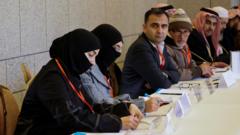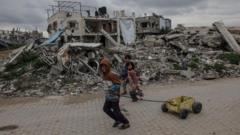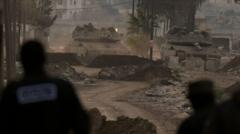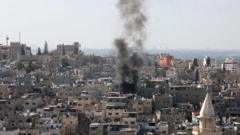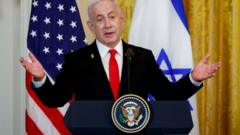The demand for demilitarization could strain relations between Israel and Syria's new leadership amid efforts for a stable post-Assad state.
**Israel Calls for Full Demilitarization of Southern Syria: Tensions Escalate**
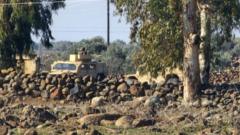
**Israel Calls for Full Demilitarization of Southern Syria: Tensions Escalate**
Israel’s Prime Minister Benjamin Netanyahu seeks total disarmament in southern Syria, potentially heightening regional conflict following Assad's ousting.
Israeli Prime Minister Benjamin Netanyahu has officially called for the complete demilitarization of southern Syria, specifically targeting the provinces of Quneitra, Deraa, and Suweida. This request indicates a shift in Israel's military strategy following the fall of President Bashar al-Assad and heightens the likelihood of conflict with the newly formed Syrian leadership.
During a recent address to Israeli military cadets, Netanyahu expressed his intention to prevent any military presence from Hayat Tahrir al-Sham (HTS) or the emerging Syrian army in these southern regions. He highlighted, "We demand the complete demilitarisation of southern Syria... We will not tolerate any threat to the Druze community in southern Syria."
Netanyahu's remarks suggest a move away from Israel's previous description of its military presence in a UN-monitored buffer zone in the Golan Heights as a temporary measure to ensure security for Israelis. His comments about remaining in the Syrian territory indefinitely underscore a shift in going from defensive posturing to a more aggressive stance amid concerns over the group's ties to jihadism.
In a response, Syria's interim president and HTS leader, Ahmed al-Sharaa, indicated a willingness to maintain the longstanding disengagement agreement made after the 1973 war and insisted on preventing Syria from being a staging ground for attacks against Israel. However, his public appeal for Israel to withdraw from the buffer zone reflects a desire to reassert national sovereignty.
The international community remains wary, with leaders like Netanyahu remaining skeptical of Sharaa’s assurances regarding peace and stability in the region. As foreign influence—with players like Iran and Russia—begins to wane, Syria's new authorities focus on establishing independence from past influences.
Moreover, the potential Turkish impact looms large as it continues to support HTS, which could influence the direction of Syria post-Assad. With Israeli military actions in the Golan being a reality, such incursions appear to challenge Sharaa’s authority as he tries to unite a fractured nation under his interim leadership, signaling that Netanyahu's demands may not be easily digestible for a country still seeking stability after years of conflict.
During a recent address to Israeli military cadets, Netanyahu expressed his intention to prevent any military presence from Hayat Tahrir al-Sham (HTS) or the emerging Syrian army in these southern regions. He highlighted, "We demand the complete demilitarisation of southern Syria... We will not tolerate any threat to the Druze community in southern Syria."
Netanyahu's remarks suggest a move away from Israel's previous description of its military presence in a UN-monitored buffer zone in the Golan Heights as a temporary measure to ensure security for Israelis. His comments about remaining in the Syrian territory indefinitely underscore a shift in going from defensive posturing to a more aggressive stance amid concerns over the group's ties to jihadism.
In a response, Syria's interim president and HTS leader, Ahmed al-Sharaa, indicated a willingness to maintain the longstanding disengagement agreement made after the 1973 war and insisted on preventing Syria from being a staging ground for attacks against Israel. However, his public appeal for Israel to withdraw from the buffer zone reflects a desire to reassert national sovereignty.
The international community remains wary, with leaders like Netanyahu remaining skeptical of Sharaa’s assurances regarding peace and stability in the region. As foreign influence—with players like Iran and Russia—begins to wane, Syria's new authorities focus on establishing independence from past influences.
Moreover, the potential Turkish impact looms large as it continues to support HTS, which could influence the direction of Syria post-Assad. With Israeli military actions in the Golan being a reality, such incursions appear to challenge Sharaa’s authority as he tries to unite a fractured nation under his interim leadership, signaling that Netanyahu's demands may not be easily digestible for a country still seeking stability after years of conflict.

